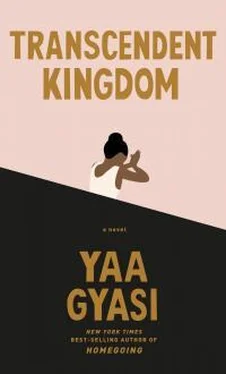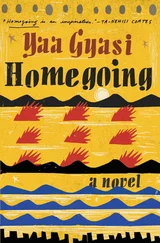By that time Nana had started kindergarten, and every day after the Chin Chin Man had finished cleaning the day care, he would take the bus to Nana’s school and the two of them would walk home while Nana told him of every tiny, boring, magical thing they had done in school that day, and the Chin Chin Man would greet these things with an interest beyond my mother’s comprehension.
When she got home from work, feet swollen, arms aching, ears stinging with Mr. Thomas’s abuse, Nana would already be in bed. The Chin Chin Man would say things like, “You see? They put the string through the holes of the macaroni to form a necklace. Can you imagine this happening in Ghana? A necklace made out of food. Why don’t they eat the macaroni instead and make necklaces out of something useful?”
My mother was jealous of how close Nana and the Chin Chin Man were. She never admitted this to me, but I could tell just by the way she delivered those stories to me over the years. She never kept a single thing that Nana or I made in school. Nana stopped giving her things, and he had never told her stories, preferring to save them for the Chin Chin Man instead. After Nana died, I think my mother wished she’d had something of his, something more than her memories, more than his basketball jersey, kept stinking in his closet, a story that was just hers to delight in.
When the Chin Chin Man put Nana to bed those nights, he would tell my brother the same story he told the day care children, that he was one of two living-man trees from Kakum Forest. Nana’s the one who told the story to me.
“I believed it, Gifty,” he said. I don’t remember how old I was, just that I was young and in a phase where I never ate but was always hungry. “I actually believed the man was a tree.”
“Who was the other living-man tree?” I asked.
“Huh?”
“He said he was one of two living-man trees. Who was the other one? Was it Ma?”
The look that came over Nana’s face—darkly contemplative, deeply proud—surprised me. “Nah, couldn’t have been Ma. If Pop was a tree, then Ma was a rock.”
—
Han had left the thermostat turned low. I exhaled and thought I could see the wisp of my breath lingering in the air. I had a jacket I kept at the lab, and I slipped it on and sat down to work. My mice staggered around in their boxes like drunks in the tank. The analogy was apt, but it still made me sad to imagine them that way. I thought, for the millionth time, about the baby bird Nana and I had found. We never could get it to drink, and after about fifteen minutes of failure, we took it outside and tried to coax it to fly. It wouldn’t do that either. Our mother came home to find us, shooing it away with our hands while it looked at us dumbly, stumbled, fell.
“It won’t ever fly now,” she said. “Its mother won’t recognize it anymore because you touched it and it smells like you. It doesn’t matter what you do now. It will die.”
Nana cried. He loved animals. Even in his last months I could still hear him begging our mother for a dog. What would he have thought of me, this work I do?
I took one of the mice out. Its head was drooping slightly from the bar that I had attached to it. I put it under the microscope so I could better see my work. The virus I injected into its brain had allowed me to introduce foreign DNA into its neurons. This DNA contained opsins, proteins that made the neurons change their behaviors in response to light. When I pulsed light in the right area, the neurons spurred into action.
“It’s kind of like an LED show for mice brains,” I once explained to Raymond.
“Why do you do that?” he asked.
“Do what?”
“Diminish your work like that.”
It was my first year of grad school and our third date. Raymond was a PhD candidate in Modern Thought and Literature who studied protest movements. He was also gorgeous, dark like dusk with a voice that made me tremble. I forgot myself when I was around him and none of my usual tactics of seduction—that is, diminishing my work—seemed to have any effect on him.
“It’s just easier to explain it that way.”
Raymond said, “Well, maybe you don’t have to do easy with me. You picked a hard career. You’re good at it too, right? Or else you wouldn’t be here. Be proud of your career. Explain things the hard way.”
He smiled at me, and I wanted to slap the smile off his face, but I wanted other things more.
When I first told my mother I was going to make a career out of science, she simply shrugged. “Okay, fine.” It was a Saturday. I was visiting from Cambridge and had promised her I would go to church with her the next day. Maybe it was the promise, words I regretted as soon as they left my mouth, that had made me announce my career intentions to her the way I did—like I was hurling a ball after shouting “Think fast!” I thought she would object, say something like, God is the only science we need. I’d been finding creative ways to avoid church since Nana’s funeral despite my mother’s occasional pleading. At first, I’d simply made up excuses to get out of it—I’d gotten my period, I had a school project to complete, I needed to pray on my own. Finally, she took the hint and resorted to sending me long, disapproving glances before heading off in her Sunday best. But then, something about my going away to college changed her, softened her. I was already my mother’s daughter by then, callous, too callous to understand that she was reckoning with the complex shades of loss—her son, an unexpected, physical loss; her daughter, something slower, more natural. Four weeks into my freshman year, she ended a phone call with “I love you,” spoken in the reluctant mumble she reserved for English. I laughed so hard I started crying. An “I love you” from the woman who had once called the phrase aburofo nkwaseas ԑ m, white people foolishness. At first she chastised me for laughing, but before long she was laughing too, a big-bellied sound that flooded my dorm room. Later, when I told my roommate, Samantha, why I was laughing, she said, “It’s, like, not funny? To love your family?” Samantha, rich, white, a local whose boyfriend would occasionally make the drive over from UMass, leaving me displaced in the common room, was herself the embodiment of aburofo nkwaseas ԑ m. I laughed all over again.
The first thing I noticed when I went back to the First Assemblies of God with my mother that day was how much it had grown since the time of my childhood. The church had taken over two stores in a strip mall and was waiting—impatiently, it seemed, given the number of prayers people made about it—for the mom-and-pop stationery store next door to give up and sell. I recognized a few people, but most of the faces were new to me. My mother and I stood out even more among all these new members—a church packed full of white, red-blooded southerners in their pastel polos and khakis, my mother brilliant in ankara.
The room hushed as Pastor John walked to the pulpit. He had grayed at the temples since the last time I saw him. He folded his hands, which had always looked to me to be two sizes too big, as though God had switched Pastor John’s hands with another man’s and, upon realizing his mistake, looked at himself in a mirror and shrugged. “I am that I am.” I liked imagining another, larger man walking around with Pastor John’s small hands. I liked to think that that man had also become a preacher with a congregation that could fit in his palm.
“Father God, we thank you for this day. We thank you for bringing our sons and daughters back to church after some time away, for leading them safely back to your feet after their stints away in college. God, we ask that you fill their heads with your Word, that you don’t allow them to fall prey to the ways of the secular world, that you—”
Читать дальше












